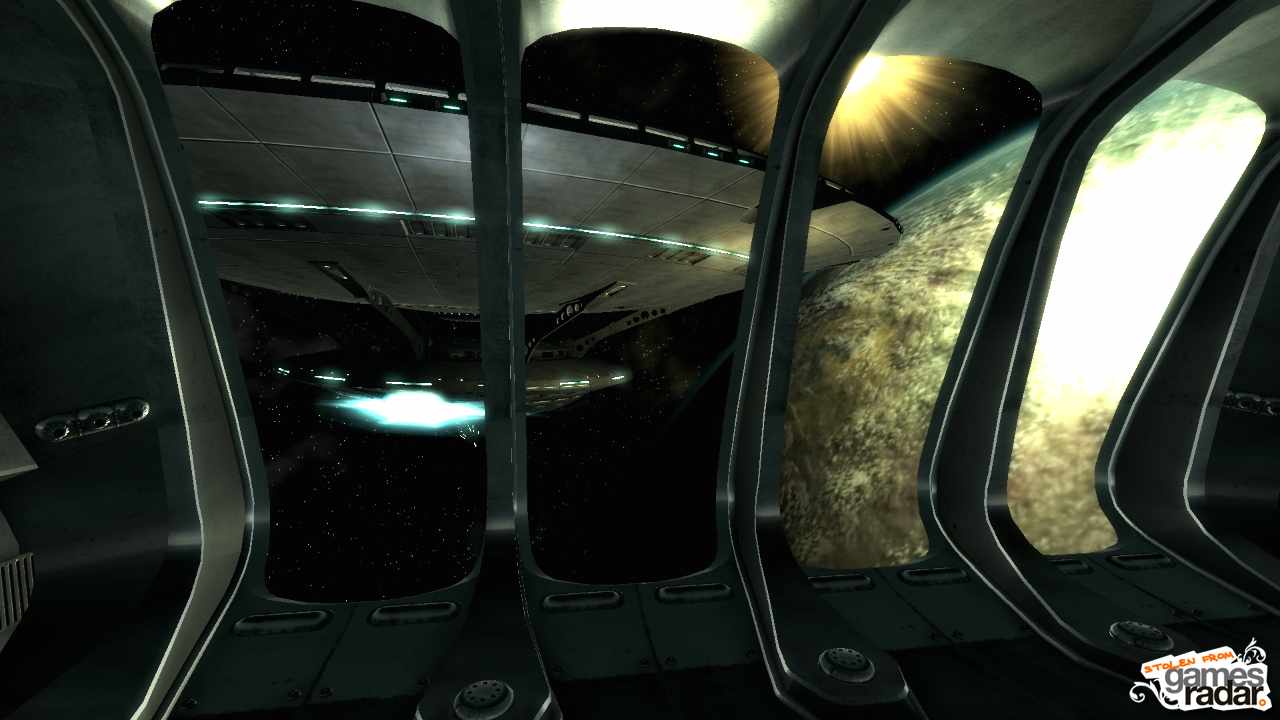GamesRadar+ Verdict
Pros
- +
Imaginative
- +
epic and brilliant
- +
Works as RPG and FPS
- +
Ripe with highlights and set-pieces
Cons
- -
Not for instant-fix gamers
- -
Not enough voice actors
- -
Unsatisfying side-quests
Why you can trust GamesRadar+
Nobody knows who dropped the first bomb, and nobody cares. 200 years have passed since a nuclear war between the U.S. and China reduced the planet to cinders, and humanity has only one concern: survival. The fallout not only destroyed civilisation, but twisted and distorted it. Humans mutated into feral monsters, water and plants were irradiated and animals grew in ferocity. But for you, life is peachy. For the past 19 years you’ve been living with your dad in Vault 101, a nuclear fallout shelter buried deep underground on the outskirts of Washington DC.
Fallout’s one of the biggest, deepest RPGs out there. Not a role-playing fan? It’s also a brutal and accomplished FPS. It tells an incredible story across 100+ hours, but it’s also packed with Call of Duty-style set-pieces. As we type, we’re 29 hours in and have finished the main story, but the volume of worthy remaining side quests is boggling. It’s a measure of Fallout’s depth that it begins with your birth – you emerge from the womb in first-person view, with squealing and crying that you control yourself. Your vision’s blurred, but you can just about see your dad (Liam Neeson), his face obscured by a surgical mask. “Let’s see what you’ll look like when you’re all grown up”, he whispers as a nearby monitor flickers to life, displaying the game’s character creation tool.
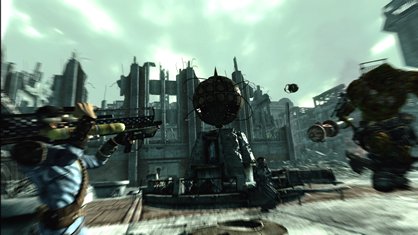
The editor is flexible, but no matter how much you adjust the sliders your character will always look vaguely the same; handsome, slim and youthful – mercifully, your appearance has no bearing on the plot. It’s in your character’s stats and abilities that the depth of customisation lies. As you go through your youth and teenage years, you’ll shape your character via a series of clever interactive ‘minigames’. In one you flick through a toddler’s book called ‘You’re SPECIAL!’ which determines your core stats: strength, perception, endurance, charisma, intelligence, agility and luck. In another, you take an exam called the GOAT (Generalised Occupational Aptitude Test) that judges how good you’ll be at things like sneaking, using weapons, picking locks and bartering with merchants.
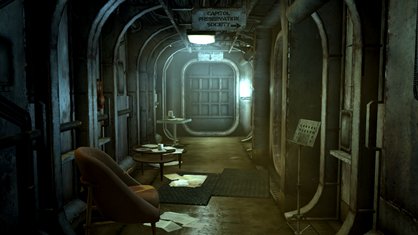
You’ll spend about an hour and a half in Vault 101, making friends, fighting bullies, struggling with moral decisions and completing tutorials. We won’t say exactly what happens as it’s one of the most compelling, intriguing parts of the game, but eventually you leave the confines of your lead-lined tomb and emerge blinking into the outside world. This is where Fallout 3 really begins. You’ll prickle with relief at escaping the claustrophobia of the Vault – the sun’s blinding – only for icy trepidation to take hold as your eyes adjust to the numbing desolation outside. This isn’t a game of rich forests, and lush spires, but cruel, brown open wasteland and haunting symbols of times past.
The Capital Wasteland stretches for miles in every direction, and what you do now is your choice. The game nudges you toward Megaton, a nearby shanty town constructed from the remains of a crashed jumbo jet, but you needn’t bother. The main ‘quest’ features the game’s best set-pieces, but if you want to build stats, and gather weapons and money to buy supplies, it’s wise to attempt one of the game’s myriad side quests. The wastes look barren and empty, but every few miles you’ll bump into someone looking for help or an offer of work. Problem is, the side quests aren’t that satisfying. You can spend an hour traipsing through a subway tunnel fighting giant ants, only to find some low-level loot and a handful of bottle caps (the game’s currency) at the end. Quests that offer up moral quandaries result in little more than raised or lowered karma (your character’s good/evil meter) and an underwhelming reward. In Oblivion you felt as if your choices were affecting communities, but the scope of your actions in Fallout is disappointingly limited.
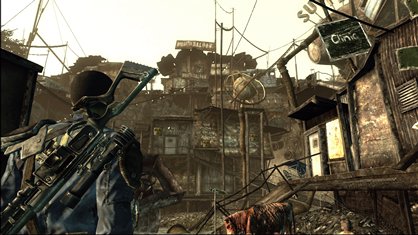
By any other standards, the game’s ripe with highlights. In a town called Canterbury Commons, two rival superheroes (the Antagoniser and The Mechanist) are at battle, turning the streets into a warzone and terrorising its residents. The mayor asks for your help, and you end up battling through each hero’s secret underground lair to end their reign of terror. You even get their ridiculous costumes as a reward if you finish the quest a certain way. And working for the slavers (human slavery is rife in the world of Fallout) is deliciously evil; especially when you’re tricking hapless eight year-old kids into a life of eternal, thankless servitude. “Here, try on this necklace, kid…” you say before explaining that it’s designed to make their head explode if they run away.
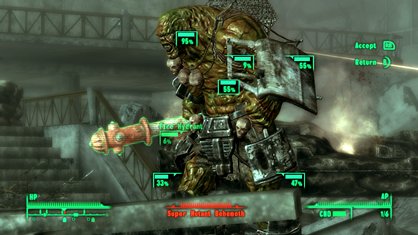
The first two Fallouts let characters with high charisma and intelligence finish the game without killing anyone, but Fallout 3 is action-packed like Call of Duty. Your VATS skill (Vault-tec Assisted Targeting System) lets you pause the action during real-time combat, then target an enemy’s specific body parts for tactical takedowns. The ability is limited by a finite allocation of Action Points (AP) that recharge over time. Your percentage of success is relative to your position and stats, so it’s no cheap fix. Do you go for a sure-fire shot to disable the enemy’s weapon? Or a risky one-kill head shot? It’s great fun, but the game’s confusing mix of familiar FPSing and RPG-style combat grates. If you fire at an enemy manually and unload ten rounds into their head, the damage you do will still be partly determined by your weapon stats, not your accuracy. And despite early promises that you’d be able to talk or sneak your way out of most situations, far too many missions leave you no option but to murder everyone with VATS, especially toward the end of the main story.
Fallout 3’s world looks incredible, tinged by the chill of the desolate, post-apocalyptic emptiness. Towns are populated with dozens of characters, all with their own stories, quests and personalities, and some locations are stunning, like the Museum of Technology (filled with interactive displays and real-world relics), Little Lamplight (a gorgeous candlelit underground city populated entirely by children) and the Lincoln Memorial, now ironically overrun by slavers.
The game’s ‘dungeons’ come in the form of sewers, abandoned Vaults (which tell eerie stories about their former inhabitants) and the Washington DC metro system. Here you’ll find hordes of enemies to boost your XP and scrap to scavenge, which is used to create new weapons. Our favourite custom weapon’s the Rock-It Launcher, which is created by combining a leaf blower, a vacuum cleaner and some other bits. When you get this, ammo isn’t a problem as the device uses random objects as deadly projectiles; coffee mugs, books, rocks etc.
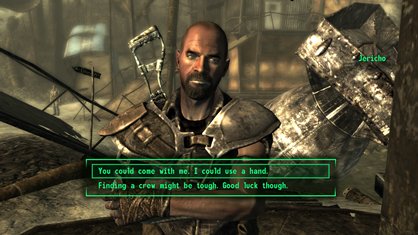
You customise your character’s abilities by choosing perks. Selected after each level, these include Cyborg (permanent boost to endurance and strength, but a loss of charisma) and Lady Killer (or its female alternative, Black Widow) which lets you seduce characters to get extra info and caps. We recommend Mysterious Stranger. With this, during VATS a random guy in a trenchcoat and hat will appear accompanied by a sting of Wild West music and kill the enemy with a pistol.
Our only major gripe is the weak voice acting, which often doesn‘t match the face of the person it’s coming from. Raiders will threaten you in a perfectly-intoned medieval brogue and every child has the same voice. It’s a critical oversight, and shatters the illusion that you’re in another world. The celebrity voice talent, however, is excellent. Liam Neeson has gravitas as your father, Malcolm McDowell is excellently pompous as the mysterious President Eden and Ron Perlman reprises his narrator’s role from the first two games. Fans will beam at his famous opening lines, “War… war never changes.”
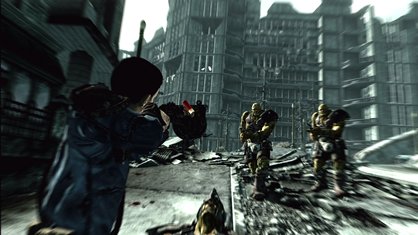
Fallout’s genius is that there’s so much to see, do and discover, and it’s rare you’ll find a character who doesn’t have a quest or directions to a new location. The game buckles under the weight of its own ambition in some of the epic scenes at the end, but wandering the wastes, finding new towns and getting involved in the world’s politics is a thrill. The role-playing isn’t as far-reaching as Oblivion and as an FPS it’s merely above average, but there are almost no other shooters of recent memory as deeply imaginative and rewarding. Only BioShock offers such a consistent, well-designed world.
Until you’ve sat with it for 30 hours, from birth to epic ending, you won’t realise how engrossing it is. The freedom may scare people used to more linear shooters and the simplified customisation might disappoint hardcore RPGers, but if ever a game was worth broadening your horizons for, this is it.
Oct 28, 2008
More info
| Genre | Role Playing |
| Description | The freedom may scare people used to more linear shooters and the simplified customization might disappoint hardcore RPGers, but if ever a game was worth broadening your horizons for, this is it. |
| Platform | "PC","Xbox 360","PS3" |
| US censor rating | "Mature","Mature","Mature" |
| UK censor rating | "Rating Pending","Rating Pending","Rating Pending" |
| Alternative names | "Fallout III" |
| Release date | 1 January 1970 (US), 1 January 1970 (UK) |
